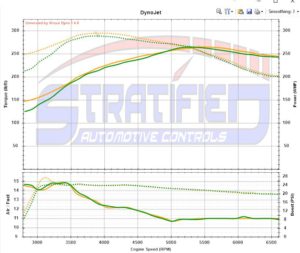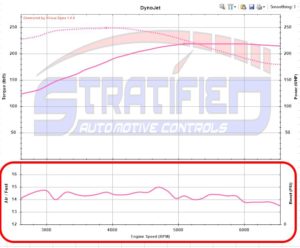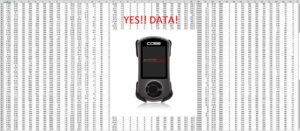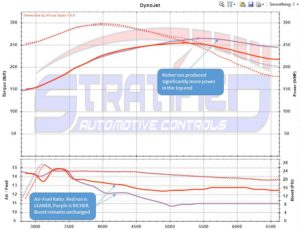Calibrating an engine revolves around solid data analysis and testing of any hypotheses. In the case of the MK7 GTI, the OEM ECU calibration commands a relatively lean air-fuel ratio (AFR) target during wide open throttle operation. For the majority of a pull, unless one of the temperature failsafe thresholds are triggered, the ECU will command a 14.7 AFR tapering to mid 13s by redline.
It has to be understood that these targets are within the context of the OEM tune. The boost pressure targets, ignition timing targets, and variable timing targets are all taken into consideration when selecting the appropriate air fuel ratio. On top of this, economical operation is a strong requirement for the OEM.
When pushing the car beyond the factory setup in order extract maximum effort from the engine, all variables including the air-fuel ratio must be reconsidered and retested.
When commanding a higher output the engine requires more in-cylinder cooling in order to avoid detonation (knock) while maintaining maximum performance. This is the case with other internal combustion engines we have worked with but we had to put the hypothesis to the test for the EA888 Gen3 as well.
The COBB Accessport gives us a very powerful analysis and datalogging tool at a high sample rate of 12hz (that means we get 12 datapoints per second for each sensor or actuator signal we log)
We tested this hypothesis in a controlled environment where we only varied air-fuel ratios. We made sure that this was done on a hot day with 91 octane fuel that is knock prone. This was done such that we can clearly see the effect of the air-fuel ratio without any other variables interfering.
Here you can see that the richer run did produce more power. The question now is why? We looked at the knock traces from both runs for to get an answer to this as boost and temperatures were identical. The graph below answers this question.
As you can see, the leaner AFRs do not offer the necessary in-cylinder cooling to prevent the engine from knocking. Yes, the engine knocks in both runs because we have setup the test as such to ensure we see a contrast between the two sets of data. However you can see that the richer air-fuel ratios result in a diminishing knock trend which in turn results in the engine making more power and staying safer!
Finally, we have to ensure the data is repeatable. For this we have two back to back runs of the richer tune. You can see that the data is repeatable within 2-3whp which gives us further confidence in the test results
 The conclusion to all this – when calibrating a vehicle outside of the OEM parameters, all variables and hypotheses need testing in order to optimize the new set up.
The conclusion to all this – when calibrating a vehicle outside of the OEM parameters, all variables and hypotheses need testing in order to optimize the new set up.Happy Tuning,
The Stratified Team





